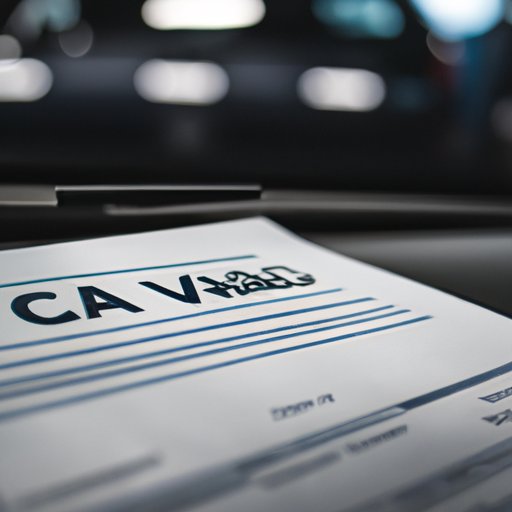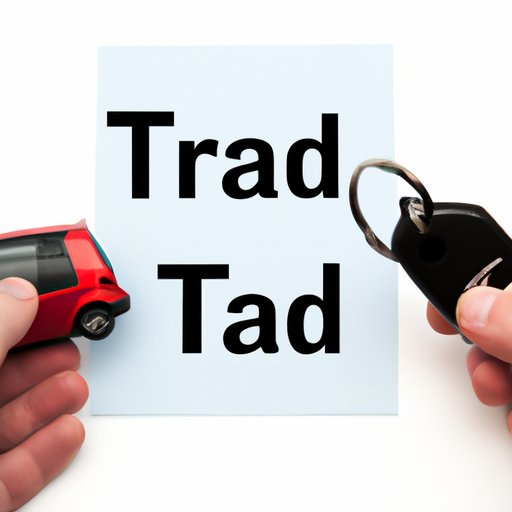Introduction
Trading in your car is a great way to upgrade to a newer model while saving money on the purchase price. But deciding whether or not to trade in your car can be a difficult decision. It’s important to understand the pros and cons of trading in your car, as well as how to determine if it’s right for you and what to know before trading in your car. This article will explore these topics in depth so that you can make an informed decision about trading in your car.
What is Trading in Your Car?
Trading in your car is a process where you exchange your current car for a new (or used) car from a dealership. The dealership will take into account the value of your current car, which will be deducted from the purchase price of the new car. This process is convenient, as the dealership will handle the paperwork and other aspects of the transaction.
Why Trade in Your Car?
There are several reasons why you may want to trade in your car. For starters, trading in your car can save you money on the purchase price of the new car. Additionally, trading in your car eliminates the hassle of selling your car privately, as the dealership will handle all of the paperwork. Lastly, trading in your car allows you to upgrade to a newer model with the latest features and technology.
Pros and Cons of Trading in Your Car
Before trading in your car, it’s important to understand the pros and cons of doing so. Here are some of the advantages and disadvantages of trading in your car:
Advantages
- Convenience – Trading in your car is a convenient process, as the dealership will handle the paperwork and other aspects of the transaction.
- Savings – You can save money on the purchase price of the new car by trading in your old car.
- Upgrade – Trading in your car allows you to upgrade to a newer model with the latest features and technology.
Disadvantages
- Value – You may not get the full value of your car when trading it in, as the dealership will likely offer a lower price than what you could get by selling it privately.
- Cost – Although trading in your car can save you money on the purchase price of the new car, you may end up paying more in the long run due to higher interest rates and other costs.

How to Determine if Trading in Your Car is Right for You
When considering whether or not to trade in your car, there are several factors to take into account. Here are some things to consider when making this decision:
Consider the Cost
One of the most important factors to consider when trading in your car is the cost. While trading in your car can save you money on the purchase price of the new car, you may end up paying more in the long run due to higher interest rates and other costs. Be sure to do your research and compare prices before making a decision.
Assess Your Needs
It’s also important to assess your needs before trading in your car. If you need a larger vehicle or one with better fuel efficiency, then trading in your car may be a good option. On the other hand, if your current car meets your needs and you can afford to keep it, then trading in your car may not be the best choice.
Weigh Your Options
Finally, it’s important to weigh your options before making a decision. Consider the cost of keeping your current car versus trading it in and factor in any incentives or special offers that may be available. This will help you make the best decision for your situation.

What to Know Before Trading in Your Car
Once you’ve decided to trade in your car, there are certain things you should know before doing so. Here are some tips to keep in mind:
Documentation
Be sure to have all of the necessary documents on hand before trading in your car. This includes the title, registration, and any maintenance records. Having these documents ready will make the process smoother and faster.
Market Value
It’s also important to know the market value of your car before trading it in. Research the current value of similar cars and use this information to negotiate a fair price from the dealership.
Mileage
The mileage of your car will also affect its value. Make sure to check the odometer and document the mileage before trading in your car.
Maximizing the Value of Your Trade-in
In order to maximize the value of your trade-in, there are a few steps you can take. Here are some tips to get the most out of your trade-in:
Preparing Your Vehicle
Before trading in your car, it’s important to prepare it. Clean the interior and exterior of the car, repair any minor damage, and replace any worn parts. Doing this will help you get the best value for your car.
Shopping Around
It’s also a good idea to shop around for the best deal. Check out different dealerships and compare their offers to get the best price for your trade-in.
Understanding the True Cost of Keeping vs. Trading in Your Car
When deciding whether to keep or trade in your car, it’s important to understand the true cost of both options. Here are some of the costs associated with keeping and trading in your car:
Maintenance Costs
One of the main costs associated with keeping your car is the cost of maintenance and repairs. As your car gets older, it will require more frequent and costly repairs. This should be taken into consideration when making the decision to keep or trade in your car.
Insurance Costs
Another cost to consider is the cost of insurance. Depending on the age and condition of your car, insurance premiums may be higher than they would be for a newer model. This should be factored into your decision when deciding to keep or trade in your car.
Depreciation Costs
Finally, it’s important to consider the depreciation cost of your car. As your car gets older, its value will decrease, which means you may not get as much money for it when you go to trade it in. This should be taken into account when deciding whether or not to trade in your car.
Examining the Financial Impact of Trading in Your Car
When trading in your car, it’s important to examine the financial impact of doing so. Here are some of the costs associated with trading in your car:
Down Payment
First, you’ll need to make a down payment on the new car. This will depend on the purchase price of the car and the amount of the trade-in value. Be sure to factor this into your budget when trading in your car.
Monthly Payments
You’ll also need to factor in the cost of monthly payments. Be sure to calculate these costs accurately, taking into account any interest rates or fees associated with the loan.

Finding the Best Deal When Trading in Your Car
Once you’ve determined the financial impact of trading in your car, it’s time to find the best deal. Here are some tips to help you get the most out of your trade-in:
Negotiating Tips
When negotiating with the dealership, it’s important to stay firm and stick to your budget. Remember, the dealership wants to make a sale, so don’t be afraid to negotiate for a better price.
Researching Prices
It’s also a good idea to research prices before trading in your car. Check out different dealerships and compare their offers to get the best price for your trade-in.
Taking Advantage of Incentives
Be sure to take advantage of any incentives or special offers that may be available. Many dealerships offer discounts or other incentives to those who trade in their cars, so be sure to ask about these before making a decision.
Conclusion
Deciding whether or not to trade in your car can be a difficult decision. It’s important to understand the pros and cons of trading in your car, as well as how to determine if it’s right for you and what to know before trading in your car. By following the tips outlined in this article, you can make an informed decision about trading in your car.
Summary
Trading in your car is a great way to upgrade to a newer model while saving money on the purchase price. However, it’s important to understand the pros and cons of trading in your car, as well as how to determine if it’s right for you and what to know before trading in your car. Additionally, you should consider the cost of keeping vs. trading in your car, as well as the financial impact of trading in your car. Finally, it’s important to research prices and take advantage of any incentives or special offers that may be available.
Final Thoughts
Trading in your car can be a great way to upgrade to a newer model while saving money on the purchase price. However, it’s important to consider all of the factors before making a decision. By following the tips outlined in this article, you can make an informed decision about trading in your car.
(Note: Is this article not meeting your expectations? Do you have knowledge or insights to share? Unlock new opportunities and expand your reach by joining our authors team. Click Registration to join us and share your expertise with our readers.)
